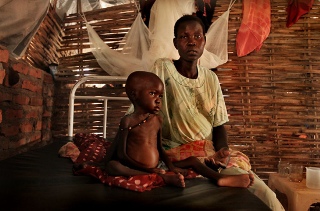MSF providing emergency medical services in Abyei
By Ngor Arol Garang
March 7, 2011 (ABYEI) -Medicines Sans Frontiers (MSF), an international organisation specialising in offering medical services in conflict-affected areas has, on Monday, said it is providing emergency medical assistance to victims of recent territorial conflict in the oil producing region of Abyei.

Neither side accepted responsibility for the clashes. Members of the Misseriya tribe blamed the armed groups from the Dinka Ngok for blocking their herders from access to water and pastures. Locals and officials from the Abyei administration and in the SPLM denied the claims and accused the northern Sudanese, Sudan Armed Forces, of backing the Misseriya. Three confrontations between 27 and 28 February 2011, and the last and heaviest confrontation, which took place on 2 March are reported to have claimed over 150 victims on both sides.
Local health centres in both Muglad and in Abyei were overstretched and subsequently ran out of medical supplies. The MSF office in Abyei said it received 21 wounded patients on 4 March 2011; some of them had sustained gunshot wounds and needed surgery.
An MSF source told Sudan Tribune on Monday the organisation provided emergency medical services to victims of the clashes they received in the outpatients department in Abyei hospital. Mercell said MSF does not go to the field to help in the evacuation of the victims, but gets assistance from local health facilities, which do not provide advanced medical care.
“MSF is not involved in evacuating casualties. We receive patients in the outpatient department in Abyei, in the hospital in Agok and with mobile clinics. For instance, MSF conducted a mobile clinic last Saturday in the village of Mading-Achueng, a few kilometres south of Abyei, where MSF suspects there are at least 1,000 newly displaced people. The mobile clinic treated 100 patients; one person was referred to the MSF hospital in Agok, 40km south; for further treatment.” said Mercell told Sudan Tribune.
The MSF officer who has been working in the transitional area of Abyei since 2006, offering primary healthcare services through an outpatient clinic in Abyei town. Their teams provide nutritional support for children under the age of five, as well as maternity and paediatric services, and also respond to emergencies. Between January and November 2010, 10,625 outpatient consultations were conducted, more than 1,204 mothers were seen in the antenatal clinic, and over 305 children under the age of five were treated for severe malnutrition, said Mercell.
The MSF worker said they were running five mobile clinics in the northern part of Abyei up until July 2010, when mobile clinic activities were suspended due to security concerns. In May 2008, following violent clashes in the transitional area of Abyei, nearby Agok became a host town to thousands of displaced people. MSF responded quickly by setting up an emergency medical program caring for the wounded and displaced.
Today, there are 70 inpatient beds and the medical teams are providing primary and secondary healthcare, including reproductive healthcare and treatment for malnutrition. Between January and November 2010, MSF staff carried out over 27,812 outpatient consultations, 1,450 patients were admitted to the inpatient department and more than 3,164 pregnant women were seen in the antenatal clinic.
In the same period, there were 668 deliveries in the maternity ward, 10,141 nutrition screenings and 2,283 children were treated for severe malnutrition. MSF has also set up an operating theatre, which enhances the organization’s surgical capacity and emergency response.
“For the time being, we have our teams in Abyei and Agok and MSF is present in over a dozen projects in South Sudan. These projects, as well as coordination in Juba, can send resources in case a potential emergency would make it necessary. MSF also has a pool of medical professionals based in Nairobi as well as in Geneva,” explained the MSF employee.
(ST)
